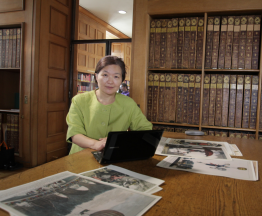Mi Kim
Bio
2012- Professor of History, NCSU
2002- Associate Professor of History, NCSU
1996- Assistant Professor of History, NCSU
1990 Ph.D. in History (UCLA)
1983 M.A. in Chemistry (University of Texas, Austin)
1981 B.S. in Chemistry (Seoul National University, S. Korea)
Projects
My research path during the past three decades has covered European history of chemistry from late 17th to late 19th century, part of which has been published as Affinity, That Elusive Dream: A Genealogy of the Chemical Revolution (MIT Press, 2003). By taking a close look at the practical and institutional evolution of eighteenth-century French chemistry, I present a much more complicated genealogy of the Chemical Revolution which is often regarded as the foundational moment for chemistry and modern laboratory sciences. This work was supported by a grant from the National Science Foundation.
My second book, The Imagined Empire: Balloon Enlightenments in Revolutionary Europe (University of Pittsburgh Press, 2016), deals with the creation of a mass public for science with the invention of the hot-air balloon in 1783. As a ‘sublime’ spectacle that drew a crowd of 200,000 to 400,000, the balloon ascension fundamentally transformed the meaning of the ‘public’ and introduced a new historical agency.
My current project, tentatively titled, Republican Enlightenment and Useful Sciences, is aimed at configuring the broadly shared moral foundation of the French Enlightenment that nurtured the development of sciences, including moral, political, and economic sciences.
Extension and Community Engagement
“Defying Gravity and Monarchy,” History Channel Podcast (Nov. 15, 2021), https://podcasts.apple.com/us/podcast/defying-gravity-and-monarchy/id1493453604?i=1000541955247
“Science as a Profession: A Historical Perspective,” Keynote in KSEA Regional Conference: Global Leadership Summit (Feb. 23, 2019, NCSU)
Invited Participant in the Blumenberg Conversation on Astrobiology and Society at the Library of Congress, May 27-28, 2015 (which ended with a public forum, “Rethinking Life on Earth and Beyond: Astrobiology and the Role of Paradigm Shifts in Science and Human Self-Understanding, https://www.loc.gov/today/cyberlc/feature_wdesc.php?rec=6818)
Consultant (and interviewee) for the documentary 1783, le premier vol de l’homme, 2010-11 [http://www.docsideproduction.fr/en/1783-le-premier-vol-de-lhomme] This became NOVA production of Ben Franklin’s Balloons (premiered on PBS, Oct. 22, 2014), http://www.pbs.org/wgbh/nova/space/ben-franklins-balloons.html
Phi Alpha Theta Lecture, NCSU, “The Aerial Theater” (April, 2007).
Interview for Essential Science for Teachers: Physical Science, Annenberg Media (produced by Harvard-Smithsonian Center for Astrophysics, 2004) http://www.learner.org/vod/vod_window.html?pid=2119, http://www.learner.org/courses/essential/physicalsci/about/contributors.html
Office Hours
Research Publications
“Enlightenment Chemistry as an ‘Experimental Science’” The Korean Journal for the History of Science 40 (2018): 237-64.
The Imagined Empire: Balloon Enlightenments in Revolutionary Europe (Univ. of Pittsburgh, 2016)
“Stabilizing Chemical Reality,” Hyle 20 (2014): 117-39.
“Material Enlightenments,” Historical Studies in the Natural Sciences 44.4 (2014): 424-33.
“Archeology, genealogy and geography of experimental philosophy,” Social Studies of Science 44.1 (2014): 151-63 [Essay review of S. Shapin and S. Schaffer, Leviathan and the Air-Pump (Princeton, 2011)]
“Invention as a Social Drama,” Technology and Culture 54.4 (2013): 853-87.
“De l’érudition à la science,” Annales de Bourgogne 85 (2013): 241-55.
“From Phlogiston to Caloric,” Foundations of Chemistry 13 (2011): 201-22.
“A Historical Atlas of Objectivity,” Modern Intellectual History 6 (2009): 569-96. [Essay Review of Lorraine Daston and Peter Galison, Objectivity (Zone, 2007)]
“Lavoisier, the Father of Modern Chemistry?,” in Lavoisier in Perspective, ed. Marco Beretta (Deutsches Museum, 2005), 167-91.
Affinity, That Elusive Dream: A Genealogy of the Chemical Revolution (MIT Press, 2003).
Presentations
“Artificial laboratory vs. God’s Nature: Rousseau’s Politics of Science,” ICHC, Vilnius, Lithuania (May 26, 2023)
“Technological Sublime and the Mass Public,” ASECS, Denver (March 21, 2019)
“A People-Machine: Visualizing the Nation in Revolutionary France,” University of British Columbia (Nov. 6, 2018)
“Patriotic Enlightenment and Useful Sciences, “Seoul National University (May 21, 2018)
“Mobile Technologies of the sublime: the balloon and the Guillotine,” HSS conference, Toronto (Nov. 12, 2017)
“A People-Machine: Balloons and the Republican Imaginary,” Workshop Knowledge, Technologies, and Mediation, Dept. of History, UCLA (Oct. 17, 2015)
“Artful Collectives,” in the Conference Colletions in Flux, Clark Library, LA (May 10, 2014)
“Conceiving a Mass Public,” Society for French Historical Studies meeting (April 6, 2013)
“Stabilizing the Objects of Chemical Inquiry,” 4th International Symposium on Structure-Property Relationship in Solid State Materials, Bordeaux (June 27, 2012)
“De l’érudittion à la science: la mode des lumières à Dijon,” Conference, l’intégration de la Bourgogne au royaume de France à l’époque modern, Académie de Dijon (May 25, 2012)
Funded Research
Republican Enlightenment (in progress) has been supported by a Franklin Research grant (2004-5) and a Mellon sabbatical grant (2007) from the American Philosophical Society, and a residential fellowship at the Columbia University’s Institute for Scholars in Paris (Fall 2007).
The Imagined Empire (2016) was supported by the National Science Foundation (2010-12), the Humanities Research Center of Rice University, Texas (Fall 2009), and the National Humanities Center (2006-7).
Affinity, That Elusive Dream (2003) was supported by the National Science Foundation (2000-1) and the Edelstein Faculty Fellowship divided between Hebrew University and the Beckman Center at the University of Pennsylvania (now Science History Institute).
Area(s) of Expertise
History of European Sciences, 17-19 C
Cultural and Intellectual History of French Enlightenment,
Women in European Enlightenment
Science and Empire, 17-19 C
